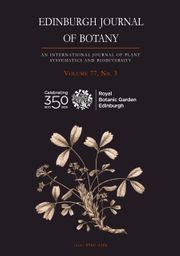Article contents
CHROMOSOME STUDIES IN TURKISH SPECIES OF NONEA (BORAGINACEAE): THE ROLE OF POLYPLOIDY AND DESCENDING DYSPLOIDY IN THE EVOLUTION OF THE GENUS
Published online by Cambridge University Press: 14 November 2002
Abstract
Seven Turkish species of Nonea Medik. (Boraginaceae-Boragineae) were studied karyologically using material collected in the field from wild populations. Somatic chromosome number and karyotype morphology were determined for each species using orcein staining. Nonea pulmonarioides is diploid with 2n=20, though some cells showed 2n=19. Nonea anchusoides turned out to be tetraploid with 2n=4x=40, while N. macrosperma was characterized by a hexaploid complement of 2n=6x=60. These data indicate polyploidy based on x=10 as a major mechanism of speciation in the perennial members of the genus. Among the annuals, N. echioides and N. versicolor showed 2n=16, while N. obtusifolia and N. lutea were characterized by 2n=20 and 2n=14, respectively. The results reveal that x=10 is more frequent in Nonea than previously realized, and that it may be the ancestral haploid number of diploid endemics of (sub)alpine habitats in the Pontic-Caucasian mountain system. The hypothesis is here proposed that the base numbers x=9, x=8 and x=7, progressively prevalent in the annual species from lower altitudes, may have originated through descending dysploidy associated with the tendency to shorten the life cycle as an adaptation to arid habitats.
Information
- Type
- Research Article
- Information
- Copyright
- © 2002 Trustees of the Royal Botanic Garden, Edinburgh
- 13
- Cited by

